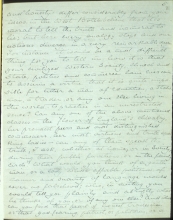Private.
My dear Brother.
Perhaps, a week ago, I would have hardly failed to embrace this available opportunity and say that your letter concerning Mr. Fern is as complete a misrepresentation of the spirit, and above all, of the attitude of M. towards the said young gentleman, as your complete ignorance of the aim he is pursuing could produce — and I would have said no more. But now, things have changed; and though you have "come to know that we" did not really possess the power of reading minds as had been pretended, nevertheless, we know enough of the spirit in which my last letters were received, and of the dissatisfaction produced, — to suspect, if not to know that unwelcome as truth may often come, yet the time has arrived for me to speak frankly and openly with you. Lying is a refuge to the weak, and we are sufficiently strong, even with all the shortcomings you are pleased to discover in us, to dread truth very little; nor are we likely to lie, only because it is to our interest to appear wise concerning matters of which we are ignorant. Thus, perchance it might have been more prudent to remark that you knew that we did not really possess the power of reading minds, unless we brought












en rapport with means "in touch, in contact with".